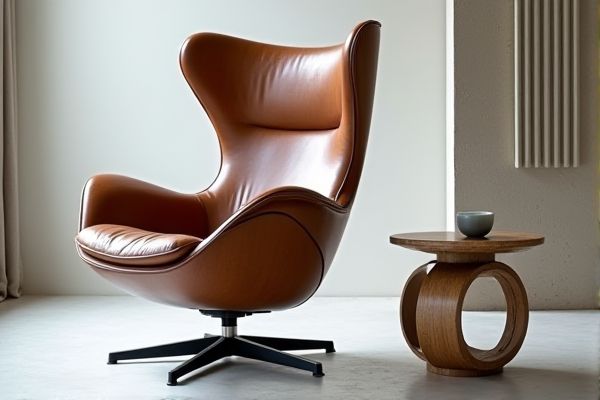
Cantilever chairs offer flexibility and a slight bounce due to their single curved support, making them ideal for stylish, comfortable seating in modern interiors. Explore the rest of this article to discover which chair best suits your needs and enhances your space.
Table of Comparison
| Feature | Cantilever Chair | Sled Base Chair |
|---|---|---|
| Design | Single continuous frame, usually L-shaped | Two parallel runners connected by crossbars |
| Flexibility | Offers slight bounce or flex for comfort | More rigid, stable seating |
| Weight Distribution | Balanced on a cantilevered frame | Weight supported by sled runners |
| Floor Protection | May cause pressure points on soft floors | Distributes weight evenly, reduces floor damage |
| Mobility | Moderate, less likely to slide | Easier to slide across surfaces |
| Common Usage | Office, conference rooms, modern interiors | Dining areas, cafeterias, casual settings |
| Aesthetic | Sleek, minimalist, modern look | Functional, classic, sometimes industrial |
Introduction to Cantilever and Sled Base Chairs
Cantilever chairs feature a unique design with a single curved metal or wooden support that creates a floating seat effect, offering flexibility and ergonomic comfort. Sled base chairs have two parallel bars forming a stable base that slides easily on surfaces, providing durability and smooth movement. Your choice depends on whether you prefer the cantilever chair's modern aesthetic and bounce or the sled base chair's robustness and stability.
Design Differences: Cantilever vs Sled Base
Cantilever chairs feature a single continuous leg that supports the seat and allows for a slight bounce, providing ergonomic comfort and modern aesthetics. Sled base chairs consist of two parallel runners connected by crossbars, offering stable support and a sleek, minimalist design suitable for various settings. Your choice depends on whether you prioritize flexibility and style in cantilever chairs or the solid stability and straightforward design of sled base chairs.
Material Comparison: Strength and Durability
Cantilever chairs commonly feature tubular steel or chrome-plated frames, providing exceptional strength and resilience against deformation, making them ideal for heavy daily use. Sled base chairs typically utilize welded steel or aluminum frames that distribute weight evenly, enhancing durability while maintaining flexibility and preventing structural fatigue. Both designs offer robust construction, but cantilever chairs excel in load-bearing capacity, whereas sled base chairs prioritize stability and longevity in varied flooring conditions.
Comfort and Ergonomics
Cantilever chairs provide enhanced flexibility and a subtle bounce effect that adapts to your body movements, promoting comfort and reducing strain during prolonged sitting. Sled base chairs offer stable support with a firm structure, ensuring consistent posture alignment, which is crucial for ergonomic seating. Choosing between these designs depends on whether you prioritize dynamic comfort or rigid stability for your seating needs.
Stability and Support
Cantilever chairs offer moderate stability through their single continuous frame, providing flexibility and slight bounce that enhances comfort but may feel less stable on uneven surfaces. Sled base chairs feature a wider footprint with two parallel runners, delivering superior stability by distributing weight evenly and minimizing rocking or tipping risks. Both designs support ergonomic seating; however, sled base chairs typically provide stronger lateral support, making them ideal for environments requiring enhanced steadiness.
Aesthetic Appeal in Modern Interiors
Cantilever chairs offer sleek, minimalist lines and an open frame that enhances the sense of space in modern interiors, making them a popular choice for contemporary design. Sled base chairs provide a sturdy, geometric look with continuous metal legs that contribute to an industrial yet refined aesthetic. Your selection between these styles will influence the overall ambiance, balancing between the airy elegance of cantilever designs and the grounded, structured presence of sled base chairs.
Space Efficiency and Arrangement
Cantilever chairs offer greater flexibility in compact spaces due to their armless design, allowing for closer placement and easy stacking, which enhances space efficiency. Sled base chairs provide stable support with a sleeker footprint, making them ideal for arranged seating in conference rooms or dining areas where uniform alignment is essential. Both chair types optimize arrangement, but cantilever chairs excel in dynamic, space-conscious layouts while sled base chairs prioritize stability and orderly aesthetics.
Maintenance and Longevity
Cantilever chairs, with their single continuous frame, typically require less maintenance due to fewer joints and moving parts, reducing the risk of loosening or wear over time. Sled base chairs, featuring two parallel runners, may accumulate dirt and require regular cleaning to prevent corrosion, but their robust design often ensures long-term durability when maintained properly. Both chair types benefit from routine inspections and appropriate cleaning, but cantilever chairs generally offer a longer lifespan with minimal upkeep.
Cost and Value Analysis
Cantilever chairs generally offer a higher initial cost due to their unique design and use of durable materials like tubular steel, providing long-term value through enhanced comfort and aesthetic appeal. Sled base chairs tend to be more budget-friendly and easier to maintain, making them ideal for high-traffic areas requiring cost-effective seating solutions. Evaluating cost versus durability and style preferences helps determine the best investment for specific office or home environments.
Best Use Cases: Where Each Chair Excels
Cantilever chairs excel in modern office and conference settings where sleek design and slight flexibility enhance comfort during extended meetings. Sled base chairs provide superior stability on carpeted or uneven floors, making them ideal for dining rooms and reception areas. Your choice depends on whether you prioritize ergonomic support or sturdy footing for the specific environment.
 homyna.com
homyna.com